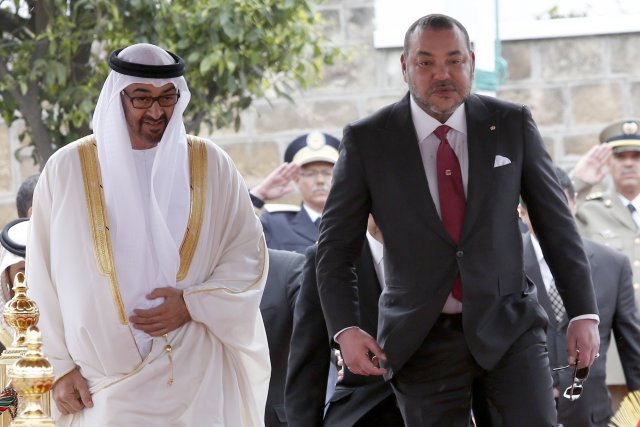News.com
AFP with The Sun
News Corp Australia Network
A Swiss man, suspected of “training” the men who allegedly beheaded two Scandinavian tourists, has been arrested, as details of the girls’ final days were revealed.
The man, who lives in Morocco, was arrested in Marrakesh on Saturday, for alleged links to suspects in the recent murder of female Scandinavian hikers Louisa Vesterager Jespersen, 24, from Denmark, and Maren Ueland, 28, of Norway.
The man is “suspected of teaching some of those arrested in this case about communication tools involving new technology and of training them in marksmanship”, Morocco’s central office for judicial investigations said in a statement.
It said he subscribed to “extremist ideology” and also had Spanish citizenship.
Police this week arrested five other people for the girls’ murders, bringing the total in custody to 19.
More: Horrific video sent to murdered hikers’ parents
Louisa Vesterager Jespersen, 24, from Denmark, was horiffically murdered in Morocco.
Picture: SuppliedSource:Supplied
Ms Jespersen and Ms Ueland were found dead early on December 17 above the village of Imlil near Toubkal, North Africa’s highest peak and a popular hiking and trekking destination.
The pair were stabbed multiple times before the killers slit their throats and decapitated them in the crime which shook the world.
A graphic video allegedly showing Ms Jespersen’s murder was filmed by one of the assailants and uploaded to social media, where it went viral after thousands of people shared it on Facebook, Twitter, 4Chan and Reddit.
Maren Ueland, 28 from Norway, was also killed. Picture: AFPSource:AFP
Local police believe the alleged killers acted without advance agreement with Islamic State or any other foreign terrorist organisation.
In a press conference in Rabat this week, police and domestic intelligence spokesman Boubker Sabik labelled the suspects “lone wolves”, adding that “the crime was not co-ordinated with Islamic State”.
Authorities allege the four main suspects — all of whom were arrested within three days of the murders — recruited up to 15 others into a hastily formed terrorist group.
Moroccans holds placards as people pay tribute to murdered Danish woman Louisa Vesterager Jespersen and Norwegian Maren Ueland in Rabat. Picture: AFPSource:AFP
“The emir of the group” was Abdessamad Ejjoud, a 25-year-old street vendor living on the outskirts of Marrakech, according to the head of Morocco’s central office for judicial investigation, Abdelhak Khiam.
Ejjoud had “formed a kind of cell that discussed how to carry out a terrorist act inside the kingdom,” he told AFP.
Investigators claim Ejjoud is one of the four men seen pledging allegiance to Islamic State leader Abu Bakr al-Baghdadi with a black IS flag in the background in a video uploaded by the group a week before the double murder.
Rachid Afatti (L), Ouziad Younes (C), and Ejjoud Abdessamad (R), the three suspects in the grisly murder of two Scandinavian hikers whose bodies were found at a camp in Morocco’s High Atlas mountains, in police custody following their arrest. Picture: AFPSource:AFP
Ejjoud Abdessamad, one of the three suspects in the grisly murder of two Scandinavian hikers whose bodies were found at a camp in Morocco’s High Atlas mountains, is in police custody following his arrest. Picture: AFPSource:AFP
Mr Khiam said the group “agreed under the influence of their emir to carry out a terrorist act … targeting the security services or foreign tourists”.
Two days before the murders, they travelled to the Imlil region “because it is frequented by foreigners” and “targeted the two tourists in a deserted area”, he said.
Moroccan police officers driving a truck carrying the bodies of the two murdered Scandinavian hikers as they are being transported from a morgue in the capital Marrakesh to the airport. Picture: AFPSource:AFP
THEIR FINAL DAYS
Described as “lone wolves”, the killers are said to have wanted to “carry out terrorist acts inside the kingdom” in revenge for Kurdish forces taking back control of ISIS-held towns in Syria.
Sickening footage of the brutal beheading was shared on social media, and even posted online to the young women’s parents.
Rachid Imerhade, a mountain guide who had met the two friends a few days before their deaths, described the pair as “happy” in their final days.
Police officers next to a tent at the scene of a crime where the bodies of two Scandinavian women were found the day before in an isolated mountainous area. Picture: KECH24 Moroccan News ChannelSource:AFP
He said: “They were smiling, chatty and sociable. They talked a lot with the other people around.”
Jespersen’s mother, Helle Petersen, told the Danish newspaper B.T. that her daughter was “always happy and positive. Everyone loved her and she saw the best in everyone”.
She added that she had warned her daughter about travelling to Morocco “because of the chaotic situation”, reported the Straits Times.
During the horrific video sent to the girls’ parents, the perpetrators cry out: “It’s Allah’s will” and are heard saying: “This is revenge for our brothers in Hajine in Syria. These are your heads, enemy of God.
A helicopter at the scene of a crime where the bodies of two Scandinavian women were found. Picture: KECH24 Moroccan News ChannelSource:AFP
POSSIBLE MOTIVE
Information indicates that the women were killed in revenge because a town in Syria that had been held by ISIS was taken over by Kurdish forces.
Morocco is said to be beefing up its security efforts to combat ISIS fighters returning from Syria and Iraq.
Authorities said 242 of the 1,669 Moroccans who joined the terror group had been arrested.
Some had used false passports and tried to hide among refugees heading for Europe as ISIS began to lose key battles in the Middle East.
Morocco, which relies heavily on tourism income, suffered a jihadist attack in 2011, when a bomb blast at a cafe in Marrakesh’s famed Jamaa El Fna Square killed 17 people, mostly European tourists.
An attack in the North African state’s financial capital Casablanca killed 33 people in 2003.











